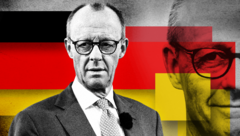As the CDU prepares for elections amidst a changing political landscape, Merz's controversial tactics raise questions about the future of German conservatism.
Friedrich Merz: The Conservative Gambler Shaking Up German Politics

Friedrich Merz: The Conservative Gambler Shaking Up German Politics
Germany's leading conservative candidate, Friedrich Merz, embraces a risky strategy, courting far-right support in bid for leadership.
Friedrich Merz, poised to become Germany's next leader, is stirring a political storm within the Christian Democratic Union (CDU) amidst a backdrop of electoral upheaval. His supporters hail him as a necessary antidote to the current European crisis of faith in traditional politics. However, his recent moves, including a push for stricter migration laws backed by far-right votes, reveal a readiness to break from norms, raising eyebrows across the spectrum.
Despite an otherwise unremarkable political career, Merz's decisive bid marks a stark departure from the legacy of his predecessor, Angela Merkel. Though his attempts to reform migration law ultimately fell short, it showcased a daring political maneuver that could resonate with voters disillusioned by the status quo following Chancellor Olaf Scholz's government collapse.
At 69, Merz is viewed as a comeback kid—having once been sidelined by Merkel, he briefly exited the political arena to pursue lucrative corporate roles. Now, as he prepares for the upcoming federal election, the stakes could not be higher.
Merz’s recent foreign policy speech at Berlin's Hotel de Rome garnered attention, though the air buzzed with the restrained excitement characteristic of a typical political gathering, contrasting with his once bright political trajectory.
Born into a conservative Catholic family in Brilon, Merz was an early member of the CDU, displaying a blend of ambition and seriousness that propelled him into politics. His experience ranges from military service to law and a stint at the European Parliament. However, his rise was uneven, thwarted initially by Merkel during their party rivalry.
Return to politics in the last decade saw Merz challenge the centrist policies of the CDU, culminating in last month’s controversial push for tougher immigration rules that leveraged support from the far-right Alternative für Deutschland (AfD). Although he denied direct collaboration with the AfD, his actions have sparked mass protests and criticism, including rebukes from Merkel herself.
Merz's political trajectory raises questions about his appeal to various demographic groups, particularly women and young voters. While some view his history with controversial votes as troublesome, allies suggest that he maintains a supportive demeanor, often described as personable and warm by those who have interacted with him in local settings.
With elections fast approaching and coalition-building on the horizon, Merz faces critical scrutiny as he navigates a precarious political landscape. The implications of his experimental tactics and their effect on potential partnerships hang uncertainly in the balance, as the EU watches closely for shifts in Germany's political dynamics.
Despite an otherwise unremarkable political career, Merz's decisive bid marks a stark departure from the legacy of his predecessor, Angela Merkel. Though his attempts to reform migration law ultimately fell short, it showcased a daring political maneuver that could resonate with voters disillusioned by the status quo following Chancellor Olaf Scholz's government collapse.
At 69, Merz is viewed as a comeback kid—having once been sidelined by Merkel, he briefly exited the political arena to pursue lucrative corporate roles. Now, as he prepares for the upcoming federal election, the stakes could not be higher.
Merz’s recent foreign policy speech at Berlin's Hotel de Rome garnered attention, though the air buzzed with the restrained excitement characteristic of a typical political gathering, contrasting with his once bright political trajectory.
Born into a conservative Catholic family in Brilon, Merz was an early member of the CDU, displaying a blend of ambition and seriousness that propelled him into politics. His experience ranges from military service to law and a stint at the European Parliament. However, his rise was uneven, thwarted initially by Merkel during their party rivalry.
Return to politics in the last decade saw Merz challenge the centrist policies of the CDU, culminating in last month’s controversial push for tougher immigration rules that leveraged support from the far-right Alternative für Deutschland (AfD). Although he denied direct collaboration with the AfD, his actions have sparked mass protests and criticism, including rebukes from Merkel herself.
Merz's political trajectory raises questions about his appeal to various demographic groups, particularly women and young voters. While some view his history with controversial votes as troublesome, allies suggest that he maintains a supportive demeanor, often described as personable and warm by those who have interacted with him in local settings.
With elections fast approaching and coalition-building on the horizon, Merz faces critical scrutiny as he navigates a precarious political landscape. The implications of his experimental tactics and their effect on potential partnerships hang uncertainly in the balance, as the EU watches closely for shifts in Germany's political dynamics.




















